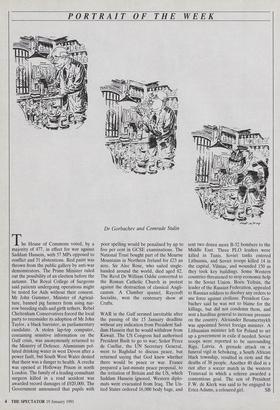PORTRAIT OF THE WEEK
Dr Gorbachev and Comrade Stalin The House of Commons voted, by a majority of 477, in effect for war against Saddam Hussein, with 57 MPs opposed to conflict and 31 abstentions. Red paint was thrown from the public gallery by anti-war demonstrators. The Prime Minister ruled out the possibility of an election before the autumn. The Royal College of Surgeons said patients undergoing operations might be tested for Aids without their consent. Mr John Gummer, Minister of Agricul- ture, banned pig farmers from using nar- row breeding stalls and girth tethers. Rebel Cheltenham Conservatives forced the local party to reconsider its adoption of Mr John Taylor, a black barrister, as parliamentary candidate. A stolen lap-top computer, containing sensitive information on the Gulf crisis, was anonymously returned to the Ministry of Defence. Aluminium pol- luted drinking water in west Devon after a power fault, but South West Water denied that there was a danger to health. A creche was opened at Holloway Prison in north London. The family of a leading consultant surgeon killed in a road accident was awarded record damages of £920,000. The Government announced that pupils with poor spelling would be penalised by up to five per cent in GCSE examinations. The National Trust bought part of the Mourne Mountains in Northern Ireland for £23 an acre. Sir Alec Rose, who sailed single- handed around the world, died aged 82. The Revd Dr William Oddie converted to the Roman Catholic Church in protest against the destruction of classical Angli- canism. A Clumber spaniel, Raycroft Socialite, won the centenary show at Crufts.
WAR in the Gulf seemed inevitable after the passing of the 15 January deadline without any indication from President Sad- dam Hussein that he would withdraw from Kuwait. The US Congress had authorised President Bush to go to war; Senor Perez de Cuellar, the UN Secretary General, went to Baghdad to discuss peace, but returned saying that God knew whether there would be peace or war. France prepared a last-minute peace proposal, to the irritation of Britain and the US, which Saddam Hussein ignored. Western diplo- mats were evacuated from Iraq. The Un- ited States ordered 16,000 body bags, and sent two dozeri more B-52 bombers to the Middle East. Three PLO leaders were killed in Tunis. Soviet tanks entered Lithuania, and Soviet troops killed 14 in the capital, Vilnius, and wounded 150 as they took key buildings. Some Western countries threatened to stop economic help to the Soviet Union. Boris Yeltsin, the leader of the Russian Federation, appealed to Russian soldiers to disobey any orders to use force against civilians. President Gor- bachev said he was not to blame for the killings, but did not condemn them, and sent a hardline general to increase pressure on the country. Alexander Bessmertnykh was appointed Soviet foreign minister. A Lithuanian minister left for Poland to set up a government in exile if needed. Soviet troops were reported to be surrounding Riga, Latvia. A grenade attack on a funeral vigil in Sebokeng, a South African black township, resulted in riots and the deaths of 38 people. Another 40 died in a riot after a soccer match in the western Transvaal in which a referee awarded a contentious goal. The son of President F.W. de Klerk was said to be engaged to Erica Adams, a coloured girl. SB


















































 Previous page
Previous page